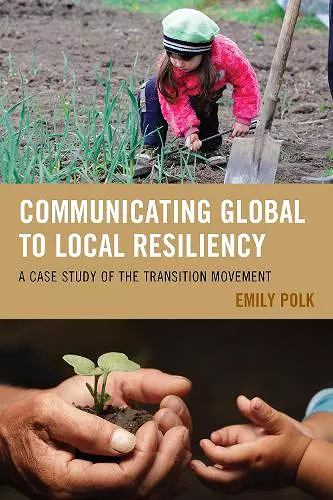Communicating Global to Local Resiliency
A Case Study of the Transition Movement
Format:Hardback
Publisher:Bloomsbury Publishing PLC
Published:23rd Apr '15
Currently unavailable, and unfortunately no date known when it will be back

This book explores the communication processes of the Transition Movement, a community-led global social movement, as it was adapted in a local context. First it analyzes how the movement’s grand narratives of responding to “climate change” and creating greater “resiliency” were communicated into local community-based stories, responses, and actions in the Transition Town of Amherst, Massachusetts. Second, it seeks to understand the multilayered communication processes that facilitate these actions toward sustainable social change. Transition Amherst developed and/or supported projects that addressed reducing dependency on peak-oil, creating community-based-local economies, supporting sustainable food production and consumption, and participating in more efficient transportation, among others. The popularity of the model coincides with an increase in the interest in and use of the term “sustainability” by media, academics and policymakers around the world, and an increase in the global use of digital technology as a resource for information gathering and sharing. Thus this book situates itself at the intersections of a global environmental and economic crisis, the popularization of the term “sustainability,” and an increasingly digitized and networked global society in order to better understand how social change is contextualized and facilitated in a local community via a global network. This book is the first comprehensive analysis of the ways in which the theories of Transition are applied over an extended period of time in practice, on the ground in a Transition town.
Polk’s Transition Movement analysis covers a broad range of topics, from culture and diversity in environmental justice to the functions of technology in building resilient and sustainable communities. Her methods provide an intimate insider view on the realities of implementing a unique environmental and social initiative such as that found in the Transition Movement. This is an essential work for anyone seeking to understand the complexities of fostering local sustainability within our vast global and digital communities. -- Mary Stroud, Stanford University
The information in this book is useful as a good overview of the Transition movement, and also as a priceless history and reminder of our very own group, the invigorating as well as the more challenging times. Reading it would be valuable to any group who wants to contribute to a stronger community, learning from our successes, and get help avoiding our pitfalls. -- Gabor Lukacs, Transition Amherst
Polk weaves an intriguing and important story of people who are concerned about sustainable practices of working together to better their own community and the planet, but she doesn't stop there. She gets at the interpersonal dynamics of the community group while painting a complex picture of the group processes of local and global decision making in a macro level movement dedicated to social change. The book is a smart analysis of how the formation of networks of communication about sustainability and community both include and exclude participation, even when promoting a vision of inclusiveness and agency for all. -- Leda Cooks, University of Massachusetts, Amherst
This book blends personal stories with scholarship on sustainability, culture, and ecological models to offer a timely and empowering account of local efforts to address global challenges. Emily Polk documents how the Transition Movement uses positive framing in online and face-to-face forms to encourage environmental sustainability, resilience, and community. Overall, this is a thoughtful treatment about how good intentions require particular infrastructures and leadership to fulfill visions. -- Patrice Buzzanell, Purdue University
ISBN: 9780739198537
Dimensions: 231mm x 161mm x 20mm
Weight: 440g
200 pages